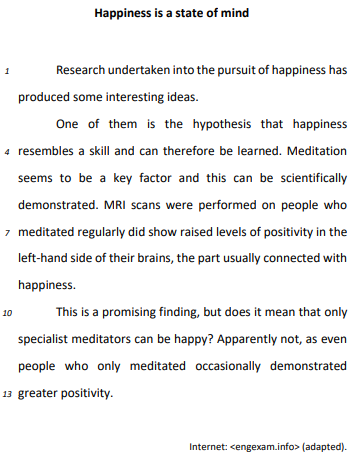Filtrar
17 Questões de concurso encontradas
Página 1 de 4
Questões por página:
Questões por página:
Concurso:
Prefeitura Municipal de Campo Verde - MT
Disciplina:
Inglês
mostrar texto associado
O alfabeto fonético internacional tem por objetivo tornar mais eficaz a aprendizagem da língua inglesa. A pronúncia da palavra “nothing” possui a representação fonética [n′ʌθiŋ]. A palavra, cuja representação fonética usa um símbolo distinto de “nothing” para representar o som do TH, é:
Brazilian learners often base their pronunciation on spelling. This tendency is understandable, given that Portuguese pronunciation closely aligns with its orthography, making it easier to transfer these habits to the acquisition of a second language. Nonetheless, it is crucial to recognize pronunciation as a vital component of effective communication, demanding clarity and comprehensibility. In order to foment that habit, educators may use the International Phonetic Alphabet (IPA), which provides symbols that accurately represent the standard sounds produced during speech. Integrating the IPA to various pedagogical approaches can significantly enhance students’ pronunciation skills. According to IPA transcriptions quoted by Swan (2005, p.xxx), the words house, occasion, cheap, with, think are pronounced as follows:
Disciplina:
Inglês
mostrar texto associado
Based on the text, judge the following items.
The final “s” in “ideas” (line 2) and “brains” (line 8) is pronounced in the same way.
mostrar texto associado
Based on the previous text, judge the following item.
In British English, the words “behavior” and “realize” are more commonly spelled “behaviour” and “realise”, respectively.
Concurso:
Prefeitura Municipal de Cerquilho - SP
Disciplina:
Inglês
mostrar texto associado
Assinale a alternativa que apresenta a palavra em que o -ed final é pronunciado como uma sílaba extra, da mesma forma que em “adopted”.
